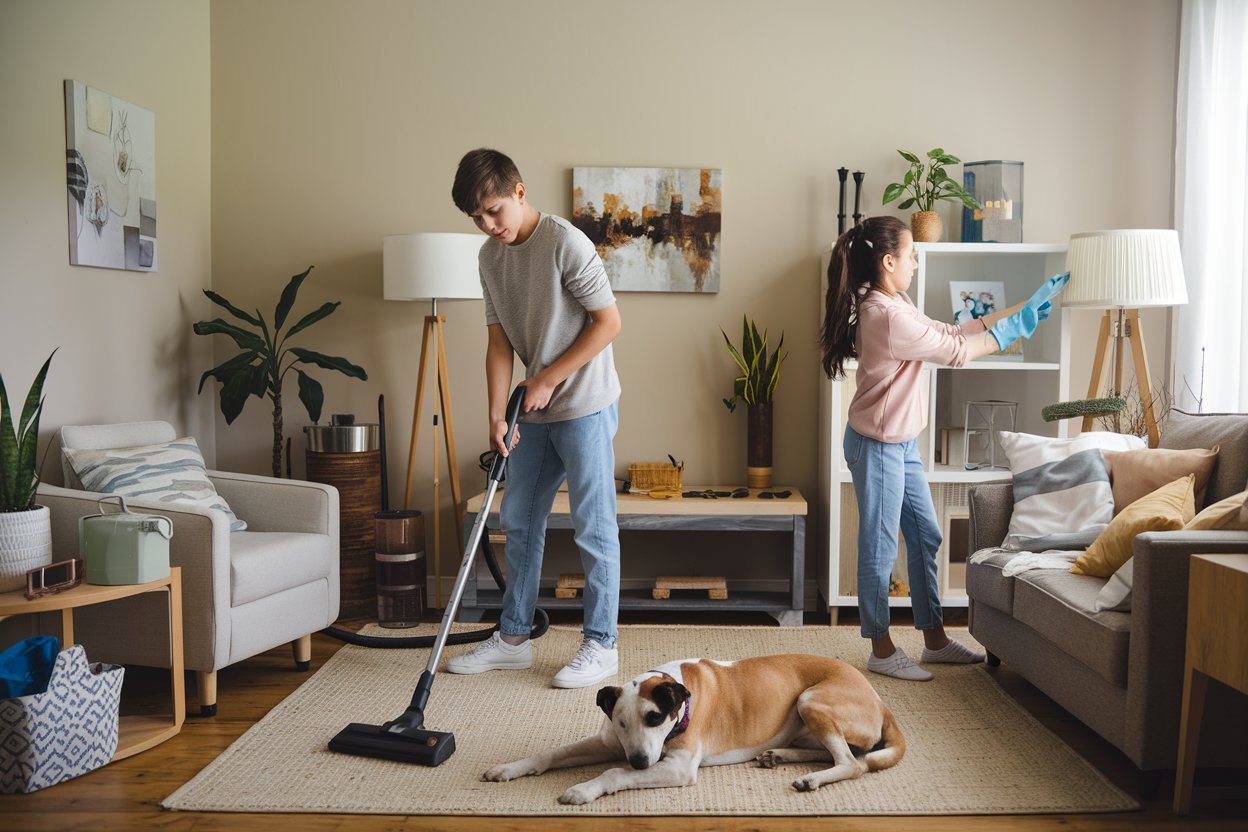
In addition to advice and apps for encouraging older children to assist around the house with (ideally) little opposition, experts offer their top task suggestions for teenagers.
How I Reduce My Grocery Spending
Close a low area of the girl using a vacuum cleaner at home to clean the floor.
Getty Pictures
Getting teenagers to volunteer for hated tasks was never simple, let’s face it. However, parents need assistance today more than ever, particularly if you’ve reduced spending and are now handling more household chores alone. The good news? Erica Keswin, a mom and workplace expert, believes that older kids want to help and that “identifying chores to have teens help around the house can lead to family harmony, which—believe it or not—isn’t a total oxymoron.”
Uncertain about where to begin? We’ve got you covered, so don’t worry.
Tasks Chores for Teens and Older Children
Your older children and teenagers can choose from a plethora of different chores, and some may be more appropriate for them than others. The ones that might work best for your child can be discussed with them. But to get you started, here are some of the most well-liked choices:
Laundry preparation, folding, and storage
- Assisting with meal preparation
- The dishwasher’s loading and emptying
- Taking care of the grounds and preparing their school lunch
- Sweeping, recycling, and trash removal
- Cleaning their room
- Take the dog on a walk
- Car washing
For a more thorough explanation of how your child can assist with each task and effective strategies for encouraging them to finish them, continue reading.
Beginning the Chore Talk With Your Child:
As you begin talking about household chores that your teen can assist with, try rebranding first. According to Susan G. Groner of The Parenting Mentor, “Chores have a negative connotation, no matter who is doing them!” To make kids feel a part of something greater than themselves, Keswin loves to transform tasks into family “rituals”; Groner kindly refers to these as “contributions.”
Then, Groner suggests getting together to talk about how everyone needs to contribute rather than just assigning jobs. “Together, create a list of everything that needs to be accomplished at home from buying groceries to feeding the dog, to doing laundry or dishes, to watering plants, and everything in between,” Groner advises. “Chances are, your kids don’t even realize how long that list will be.”
After that, let your older children select the activities they wish to try. Keep in mind that these don’t have to be their permanent positions; attempt to get together again in a week or so to discuss what worked well and what obstacles they faced.
In order to avoid having to remind them (we know, we know..), Groner also advises setting some guidelines for the time of each item on the list. “You don’t want to be the chore warden, and if interaction from start to finish is respectful towards your children, they will appreciate it,” Groner explains.
22 Tasks for All Kinds of Children
Using Chore Apps to Hold Children Accountable
“We’ve moved from color-coded chore charts to more digital options that can help her understand the relationship between chores and their financial impact as my own daughter gets older,” says Joy Altimare, a parenting consultant with EHE Health. (Although there are differing opinions about compensating kids for chores, we’re presuming that for teenagers, chores and allowance are related.)
Many of the professionals we interviewed recommend creating reminders with technology. “Let them come up with their own ideas, like setting an alarm on their phone,” Groner advises. Another suggestion is to make use of new chore applications that also streamline allowance payments and provide virtual work charts.
Here are some ideas created especially for teenagers to think about:
The green light
A chore tracker feature can be added to this debit card app for children under parental supervision, allowing you to pay the allowance when tasks are finished. Additionally, you and your kid can select whether to allocate a percentage of their payments to spending, charity, or savings.
Debit cards for up to five children are included in the $5 monthly fee.
BusyKid
According to BusyKid Altimare, this app is easy for us to use: “I assign the task and include the value. The money is moved to one of several buckets: her allowance bucket (accounts), her savings or contribution bucket (for charity), or to spend immediately when she finishes the task and taps the dashboard to confirm it.
Note: This software claims to be suitable for users up to the age of 16, which may make some teenagers uncomfortable because of the word “kid” in the name.
Cost: $4 a month with yearly billing
Henry, go!
A debit card, smartphone app, or website that lets parents set up automatic allowances or chores for their kids to earn additional cash. It’s a simple approach for parents to protect their teenagers from the risk of debt while teaching them independence and financial responsibility.
Monthly cost: $4.99 per child. Up to four accounts can be added.
It’s acceptable when TikTok Mom gives a babysitter more money in exchange for doing extra chores.
The Chores for Teens Ideas
The best part comes when you’ve worked out how to hold teenagers accountable and how to have a conversation with them about helping out around the house.
These are our panel of experts’ top chore recommendations for teenagers. However, before you begin, schedule a meeting with your young adults to talk about your home requirements. You can be sure that you will come up with a plan that works for your family when the tasks align with their interests and abilities.
Dusting, mopping, and vacuuming
This trifecta of cleanups can be divided into discrete tasks, but perhaps let your kid attempt each one to see if they enjoy it more or are better at it. You might want to mention, Keswin suggests, that the All Blacks, New Zealand’s renownedly tough rugby team, all take part in a behind-the-scenes practice known as “Sweep the Shed,” or cleaning the locker room.
Emptying the trash and recycling
The most common chore request from the parents we spoke with was to take out the garbage.
Since it takes place on a weekly basis, it’s a fairly simple “one and done” chore to get teens started and works well as a reminder on a phone app.
Cleaning the room
Parents everywhere have a timeless request: tidy your room!
For best results, try dividing this into smaller tasks: Get rid of clutter, vacuum their own area, make their bed (either simply straightening it every day or changing the sheets once a week), and, if they have a bathroom, clean it.
At what age is it too late to clean your child’s room?
Doing laundry
Once they leave home, they will be unable to function without this ability. To help kids keep track, start by asking them to designate one day as “their” washing day.
If students wish to avoid wearing pink T-shirts for the remainder of high school, sorting is crucial. Would you like them to fold it as well? Be sure to be explicit.
“Teens should be in charge of putting away their own laundry so they can’t blame anyone else (read: their parents) when they can’t find their soccer jersey for the away game,” Keswin explains.
Working in the kitchen
Clearing and setting the table. Too simple? Let’s load and empty the dishwasher, shall we? If you up the ante and include potwashing, supper can end up being the most peaceful time for parents to spend at home.
Some other concepts:
Food leftovers should be separated for the compost, if you use one.
Store any leftovers.
After supper, sweep the floor and clean the cabinets and counters.
Upkeep of the outdoors
Teenagers can earn extra money by providing their services to neighbors in traditional methods, such as mowing the lawn or shoveling the walkway. There’s no reason why this shouldn’t be considered if your house requires exterior maintenance.
Here are some further suggestions:
- If you have a garden, assist with watering and/or weeding it.
Rake departs - If you have a pool, skim the debris out.
- Assist an adult with gutter cleaning
- Walking dogs and taking care of pets
A dollar for each time a parent told us, “My child promised to walk the dog when they asked for a puppy, and now I’m the only one who does it,” would allow us to purchase anything we could possibly need at the pet store!Teens who are passionate about animals are more than capable of taking on the responsibility of providing food and comfort for their live companions, and they frequently do so. They can attempt the following easy tasks:
- Scoop the excrement and take the family dog for a walk!
- Make sure your pet’s food and water are clean.
- Make sure your pet’s bedding, crate, or cage is clean.
Preparing food
Does your adolescent have a favorite food? Do they enjoy trying new things in the kitchen? Have them prepare lunch for the family on the weekends or bring over dinner once a week if they have a culinary bent.
Consider segmenting the “cooking dinner” task into a number of parts, such as grocery shopping and menu planning with a parent, cooking, and cleanup.
The Greatest Teen Volunteer Opportunities, Per Skilled Parents

Taking care of children
Is it a chore to spend time with younger siblings? If you ask a teenager, they would probably say that this is a top priority when it comes to family duties. Additionally, it’s one of the most crucial methods to teach responsibility and empathy, according to parenting expert Reena Patel. Additionally, they can earn a respectable living by babysitting other children if they have an interest in looking after their younger siblings.
Think About Safety Concerns
The majority of teenagers are old enough to handle household tasks with minimal oversight. However, each teen is unique. When making your teen’s chore list, take into account their degree of proficiency.
Emphasize the dangers of the home.
Make sure your teen understands and is informed about common household risks and safety concerns. Make sure they understand what to do in the event of an accident and teach them how to avoid them.
Household chemicals, for instance, may pose a risk. Discuss ventilation concerns and the significance of avoiding chemical mixing with your teen. Don’t forget to talk about what to do if your teen gets a chemical in their eyes or on their skin by mistake.
Discuss safety precautions with your teen before letting them use the stove, lawnmower, weed eater, power tools, or other appliances. Before you let your teen utilize those things on their own, keep an eye on them.
Verify that they understand and follow safety procedures, such as handling extension cables properly (never plugging in a frayed or wet cord, for instance).
The Bottom Line
Whether you refer to it as a “contribution” or a “chore,” your teen is mature enough to assist with more important tasks, which can help them become ready for adulthood. Together with your teen, come up with a plan that is suitable and respects everyone. Keep in mind that your teen (or you!) doesn’t have to feel punished for doing chores.



